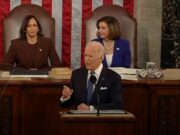The Committee for Economic Development’s free lunch has come and passed, and the organization has also published an issue brief, “Hiding in Plain Sight: The Problem of Transparency in Political Finance.”
Yesterday’s event was, as expected, surreal. Representatives from the two firms who conducted the “survey” introduced the poll. Hart Research Associates President Geoffrey Garin, referring to himself and American Viewpoint’s Senior Vice President Gary Ferguson (or their firms, it was unclear from context), said that “in full disclosure” they had both worked for greater disclosure throughout their professional careers.
Mr. Garin also said that both firms anticipated objections against the poll on grounds that it was poorly designed and asked awful questions. Giving credit where credit is due, this was a refreshingly frank admission. But, given the pollster’s commitment to transparency, one must wonder why the survey’s full methodology remains unavailable at this time.
The panel consisted of Altria’s Assistant General Counsel Wesley Bizzell, Campbell Soup’s VP of Government Affairs, Kelly Johnston, Lead Bank’s Chairman Landon Rowland, former FEC Commissioner (and former Colbert Super PAC attorney) Trevor Potter, as well as Bobby Burchfield, who argued the RNC’s case before the Supreme Court in McConnell v. FEC. The panel was heavy on rhetoric about the alleged dangers of money in politics, with only Mr. Burchfield aggressively critiquing the poll’s methodology.
After Mr. Burchfield’s take-down, Mr. Garin re-affirmed that the poll was not a sampled survey, but an invite-only, opt-in internet survey of some kind.
CED’s issue brief, adds little to the debate. It asks us to be shocked about “$311 million in spending by organizations that did not disclose their donors to the Federal Election Commission” in the 2012 campaign. But the report passes over inconvenient facts that undermine its case.
For one, it ignores that more political spending is disclosed now than at any point in American history. It ignores that all candidates, parties, PACs, and Super PACS disclose all contributors above extremely de minimis amounts ($200, in most cases).
Further, it ignores the total amount of spending in federal races which, according to the FEC, was $7.3 billion. Or, rather, seven thousand three hundred million. $311 million turns ought to be just about five percent of total spending on federal elections.
The report asserts that the “surge in spending” of tax-exempt entities “is primarily due to the activities of a relatively small number of politically active organizations—twenty-eight in all.” Sounds ominous.
But as CCP Chairman Brad Smith testified just over three months ago before the Senate Judiciary Committee’s Subcommittee on Crime and Terrorism, “[m]ost of these [28 groups are] well-known entities, including the U.S. Chamber of Commerce, the League of Conservation Voters, the National Rifle Association, Planned Parenthood, the National Association of Realtors, the National Federation of Independent Business, NARAL Pro-Choice America, and the Humane Society. Several of these groups also spent substantial funds on issue ads or express advocacy…even before Citizens United, suggesting that the growth in ‘undisclosed’ spending is even less than many believe.” Other members of the “Infamous 28” include Crossroads GPS and Americans for Prosperity—whose donor base and political intentions are clear.
And of course, the issue brief says nothing about this opt-in, online, non-sampled, “survey.” Which, given how indefensible it is, all the better.













